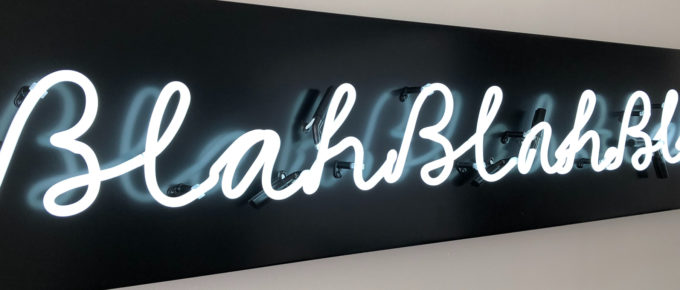Every year, the Ride for the Breath of Life raises funds for Cystic Fibrosis research. I have been participating for many of the seventeen years that the ride has been held. This year, my participation was once again virtual, as I rode alongside but at a distance with those that gathered in Edmonton. It was a spectacular day, for a very important cause. It is a cause that I am happy to support, and I’m grateful for the generosity of everyone that sponsored my participation.
Buzzwords Bug Me… A lot
I have a singular aversion to buzzwords. It is powerful, it is visceral and most of the time it exists on a hair trigger. There are certain words and terms that I avoid using except when absolutely necessary. Their use by others produces in me suspicion and mistrust. I have more-or-less acknowledged this reality for a long time, but I only recently took a moment to stop and ask myself why I react this way. It was an interesting reflection.
How Do You Answer “What Do You Do?”
An enduring question when encountering a new acquaintance is, “What do you do?” (This is especially true if you live in North America). Answering that question—particularly if you want your answer to be compelling and memorable—can be hard. The safe answer is to go with a functional description of what you do. Even comprehensive statements of job function can sound still sound vague and abstract (and be in no way unique). When you want to stand out in your answer, you need to reframe how you define the question.
Hope, But Pragmatism
How do we make a difference in the world? In particular, how do we make a difference in the face of adversity? These are difficult questions to ask at the best of times. They are especially challenging questions to ask right now. The world is a scary place that feels like it is getting scarier. It is easy to despair of it all, to want to give up and withdraw and make it all go away. Figuring out what to do instead is hard. One path forward comes from the intriguing intersection of ideas shared by a writer, an admiral and a psychologist (not the punchline for a joke).
Trust But Verify
One of the enduring phrases my father taught me is “trust, but verify.” It is not one that I use myself very often. But it is one that I think about a great deal. Within those three simple words is a great deal of complexity, and an opportunity for a profound amount of insight. It is a phrase that can also be misused: we can be overly intrusive in our approach, but we can also be neglectful. The challenge, as always is finding balance. How much can you trust? And how much do you need to verify?
Cracks Around the Liminal Edges of Re-entry
We crossed the threshold of two years with the pandemic just a few days ago. We all entered into this liminal experience together, unequal though that still was. Two years on, we are not all leaving it together. There are more than cracks around the edges, and our personal experiences are fragments of a shattered whole. For those still trying to navigate through to the other side, there are insights that liminality has to offer, and perspectives to manage wrestling with the complex question of, “What’s next?”






